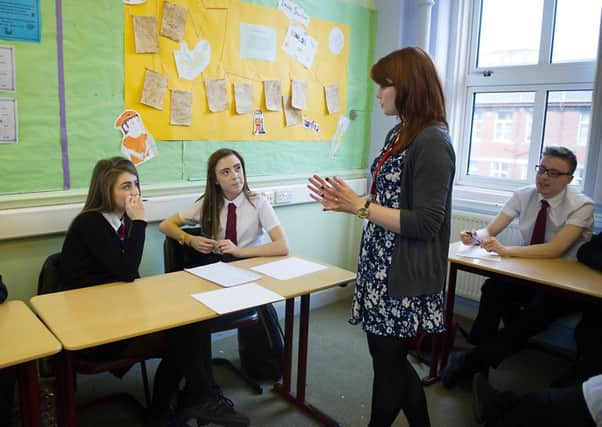Graham Boyack: Get pupils to sort out conflict by themselves and reap the benefits


When I look at how society deals with conflict, the usual responses are either avoidance or confrontation.
Confrontation can build barriers to people engaging in a way that is likely to help everyone understand the cause of the conflict, and then be in a place where they are prepared to talk about it in a constructive way.
Advertisement
Hide AdAdvertisement
Hide AdAvoidance can make things worse by letting presumed reasons for actions simmer in people’s minds, such that, when it is considered, the issues have become worse and people can be more entrenched.


So why does this matter?
The better able we are to engage in conflict resolution, the better we will be at understanding each other and creating solutions and ways forward that benefit everyone. For us to engage, however, I think we need to be equipped to do so and that’s why I support the spread of mediation skills to as many people as possible.
Mediation also builds confidence and a broad communication skillset to help young people deal more effectively with conflict and other challenging social situations.
This can have a significant positive effect on both mental and physical wellbeing. An example is peer mediation in schools. The initiatives taking place in schools to train students in mediation, and then provide them with the opportunities to use those skills to resolve conflicts between pupils, is a great example of why mediation and giving people those skills works.


Scottish Mediation has been working with schools through our Young Talk Project and the evaluation of our first two years’ work was clear. Children, young people and school staff working with them consider that learning and practising peer mediation has helped them develop their confidence and interpersonal skills across a wide range of contexts.
Staff also consider that peer mediation has a very positive impact on school life, notably in enhancing learning – including the Curriculum for Excellence, creating better relationships between pupils, reducing disciplinary referrals and suspensions from school and freeing up time for teachers.
What was more difficult for schools was resourcing the projects and sustaining the work over a longer period and through different cohorts of pupils. Over the next two years our aim is to create a sustainable best practice model for peer mediation which will, in due course, allow an extension across Scotland.
The work so far suggests that a ‘cluster’ model is likely to be most successful, where young mediators are trained and supported, not only by their schools, but also by the wider community, including higher education institutions, local authorities and ‘mediation champions’ from other relevant organisations.
Advertisement
Hide AdAdvertisement
Hide AdThis work is important because peer mediation enables young people to resolve conflicts themselves, rather than always relying upon teachers and other adults, and creates calmer learning environments by reducing conflict in the school.
Peer mediation develops the confidence of young people to not only deal with conflict itself, but also other challenging situations that life throws at them and to manage social relationships and situations.Taking ownership and responsibility for social interactions, empowers young people and enables them to tap in to their own potential to change their lives for the better.
Conflict and diversity is present in every school around Scotland and peer mediation uses these already present elements of school life as tools for learning and development.
There is also the future impact of those skills being used through the rest of school and into adult life – how conflict situations might either be avoided or dealt with better when they occur, and what impact that might have on future relationships in which people engage. There is great work going on to support families in conflict and to work with young people faced with homelessness. Peer mediation has the potential to have a preventative role, particularly when combined with the efforts of the Scottish Centre for Conflict Resolution to spread those skills more widely.
My message for Mediation Awareness Week is for support to be continued and if possible extended – it’s an investment that needs to be made.
Graham Boyack, director, Scottish Mediation.